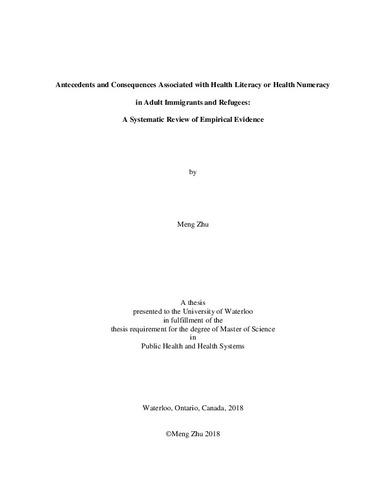| dc.description.abstract | Background: Health literacy and health numeracy refer to skills that are fundamental and essential to fulfill health activities. Limited health literacy and numeracy levels have been associated with various poor health outcomes, such as increased emergency department or hospital visits, difficulty in interpreting health messages, inability to take medications properly, and increased mortality in older people. Immigrants and refugees tend to have inadequate health literacy skills, compared to the native-born population, indicating that they may be more susceptible to suffer the negative impacts of low health literacy. Currently, many empirical studies have investigated the antecedents (factors which could influence or predict health literacy or health numeracy, such as demographics) and consequences (outcomes that result from different health literacy or numeracy levels, such as mortality) of health literacy or health numeracy in adult immigrants and refugees. However, efforts that summarize the relevant empirical evidence do not exist.
Objectives: The thesis research aimed to bring together individual empirical studies dispersed in the literature and synthesize both quantitative and qualitative evidence in regards to antecedents and consequences of health literacy or health numeracy in adult immigrants and refugees by applying the systematic review approach. My purpose was not to quantitatively synthesize the results on a specific antecedent or consequence in a specific immigrant or refugee population, but to narratively summarize the relevant evidence to provide information on what antecedents and consequences of health literacy or health numeracy have been investigated in the adult immigrants and refugees, to identify potential research gaps, and to offer insights for future research and practice.
Methods: The reporting of the systematic review mainly followed the Preferred Reporting Items for Systematic Review and Meta-Analysis Protocols (PRISMA) checklist. Index terms and free terms relating to health literacy, health numeracy, immigrants and refugees were searched in eight databases, including PubMed, Embase, Cumulative Index to Nursing and Allied Health Literature (CINAHL), PsycINFO, SCOPUS, the ProQuest Dissertations & Theses database, the Conference Proceedings Citation Index-Science (CPCI-S), and the Conference Proceedings Citation Index-Social Science & Humanities (CPCI-SSH). Studies that met the eligibility criteria were included. The reviewers assessed the risk of bias of each individual study and narratively synthesized the extracted evidence by thematic identification. The thematic identification mainly followed the framework approach, in which a working thematic framework was established. The working thematic framework consisted of themes and subthemes pre-existing in Sorensen’s comprehensive conceptual model for health literacy and numeracy. Antecedents and consequences from the included studies were coded with these themes and charted into a matrix, the row of which represented an included study, and the column of which denoted to the themes. Additionally, we also carried out inductive thematic identification for the antecedents and consequences that did not fit the pre-existing themes.
Results: In total, 77 included studies, published between 2004 and 2018, were included. Forty-nine of them were quantitative research, out of which 47 applied the cross-sectional study design and two adopted the cohort study design. The rest 28 included studies were qualitative, all of which conducted thematic analysis with information collected by interviews or focus groups. Sixty-seven studies focused on only health literacy; 1 on health numeracy only; and 9 involved both. In terms of the research sample, 63 included studies involved immigrants, 13 investigated refugees, and one involved both. Twenty-four and 58 included studies explored antecedents and consequences, respectively. The antecedents were coded with the following themes (subthemes): personal antecedents (personal characteristics and personal competence), societal and environmental antecedents, and personal belief, experience, and behaviour. The consequences were coded with themes including health service use or behaviour, health outcome, health cost, health experience and perception, and health knowledge and understanding.
Conclusion: The systematic review was the first study to examine the current state of the research activities on antecedents and consequences of health literacy or health numeracy in the population of adult immigrants and refugees. Our major findings suggest the following recommendations: 1) Future research needs to direct more focus on other health literacy dimensions, such as interactive critical health literacy, rather than the functional dimension of health literacy (i.e., reading and writing skills) in adult immigrants and refugees. 2) More empirical research is needed on antecedents and consequences of health numeracy in adult immigrants and refugees. 3) Inductively identified themes such as “personal belief, experience, and behavior” for antecedents and “personal experience and perception” and “knowledge and understanding” for consequences should be added for the further development of the current framework for health literacy and health numeracy in the context of immigrant and refugee health. 4) More research is required on the associations between health cost and health literacy or numeracy in adult immigrants and refugees. 5) Future quantitative studies need to apply more advanced study designs (e.g., cohort studies) and improve the sampling methods to increase their research validity. 6) Immigrant- and refugee-specific antecedents (e.g., primary language, acculturation, duration of residence in the destination country) and consequences (e.g., health needs) should draw more attention in future empirical research. | en |

